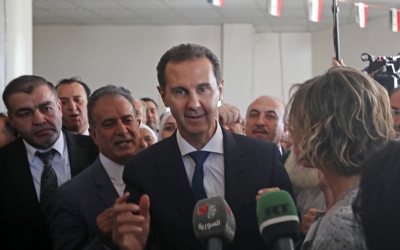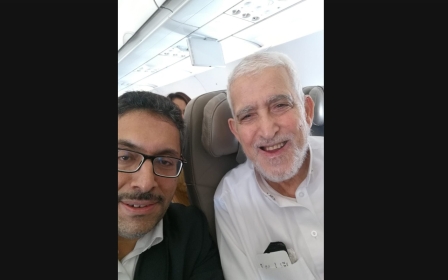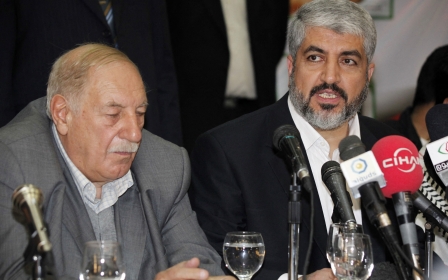Syria: Assad supporters wary of Hamas reconciliation

A jubilant Khalil al-Hayyeh could not conceal his smile as he stood on the steps of the presidential palace in Damascus on Wednesday before announcing reconciliation with the Syrian government.
Al-Hayyeh, Hamas’ chief of Arab relations, was a central figure in the much anticipated, decade-long, rapprochment efforts between the Palestinian group and the government of President Bashar al-Assad.
'For the Syrians, Hamas left them, even abandoned and betrayed them at their most sensitive and crucial time. It's easy to forgive... but they will never forget'
- Damascus-based Palestinian political figure
Hamas, which governs the besieged Gaza Strip, was one of Syria's closest allies, with headquarters in the Syrian capital, and its leaders often found refuge in the country due to its shared position on the Palestinian struggle.
In 2012, however, Hamas left Syria after backing the street protests against the Assad government, the crackdown against which spiralled into the country's civil war. The group then moved its headquarters to Doha.
While many see the re-alignment of the two previous allies as a sign the region could be heading in a new direction, the reconciliation itself doesn’t come without suspicion and mistrust based on historical differences.
This is especially true within loyalist pro-government sectors who view Hamas with disdain following the group’s decision to leave Syria and side with the opposition.
Conspicuously, Hamas has departed from its initial policy that hailed the Arab revolts that toppled governments in Tunisia, Egypt and Libya.
When the Arab Spring came to Syria, Hamas leader Khaled Meshaal - whose absence was reportedly a Syrian demand for the reconciliation efforts - declared a break of relations with the Assads and quickly left the country.
Syrian media were quick to attack Hamas’s decision to leave in January 2012, describing it as “shifting the gun from the shoulder of resistance (against Israel) to the shoulder of compromise”.
Deep mistrust
Despite the political benefits of Assad’s realigning with Hamas - which include potentially improved relations with Hamas’s allies Qatar and Turkey - there is still considerable scepticism within loyalist circles in Syria towards the Palestinian group.
While many feel that the Palestinian faction, which was previously vocal in support of the armed opposition in Syria, can genuinely mend ties with Damascus, initial reaction to the reconciliation has been muted, if not hostile, in pro-Assad circles.
Hamas was accused of supporting anti-government militant groups in the Yarmouk camp on the outskirts of Damascus during the war.
Syrian MP Nabil Saleh was critical of the deal. “Yes, we are bringing Hamas back to our struggle after the past years, they have bitten us, poisoned our bodies, and killed many of us, Syrians and Palestinians,” he wrote on Facebook.
One Damascus-based Palestinian political figure speaking on condition of anonymity told Middle East Eye that Hamas’ return is just the start, but that the Syrian side was still wary.
“For the Syrians, Hamas left them, even abandoned and betrayed them at their most sensitive and crucial time [2012]. It's easy to forgive because it's politics, but they will never forget. It will take a long time to re-establish trust.”
Meanwhile, blogger Firas Khalifa wrote on Facebook that “Hamas are not welcome in Damascus.”
“Their return is serving strategies far from the interests of the Syrian people. This determination on political Islamisation reflects dangerous trends that will burn the region, first and foremost Iran; the signs began in the streets of Tehran.”
Likewise, Assad supporter Fatimeh Sleiman lambasted the deal. “Thank you [Hamas] for killing our youth, blaming us, and blaspheming us," she wrote on Facebook. "The families of the fallen and their children say thank you from the heart. We don't dismiss them with politics, but understand that the blood of our youth is cheap.”
An outcome of the Abraham Accords?
Al-Hayyeh on Wednesday was joined by top Hamas figure, Osama Hamdan, and several officials representing different Palestinian factions such as the Popular Front for the Liberation of Palestine-General Command’s [PFLP-GC] Talal Naji who were received by Assad.
According to al-Hayyeh, the Syrian president was “keen on Syria’s support to the Palestinian resistance”.
'There was a choice, and US and world leaders chose wrongly by pushing Palestinians away. The result is Hamas-Assad reconciliation'
- Alexander Langlois, analyst
"This is a glorious and important day, in which we come back to our dear Syria to resume joint work," he told reporters. “God willing, we will turn the old page and look for the future.”
He also condemned “Zionist or American aggression on Syria.” The Arab country has been a target of hundreds of Israeli air strikes in recent years, while US forces occupy territory in the northeast of the country.
Maher al-Taher, the official in charge of international relations in the PFLP (a separate, rival Palestinian political group to PFLP-GC), announced that the front had received an invitation to participate.
“Syria has always been with the resistance and therefore receives the resistance factions,” al-Taher said.
Analyst Alexander Langlois told MEE that part of the reason for Hamas’ decision is the region’s political situation regarding the Palestinian cause, especially following normalisation agreements between Israel and several Arab states.
“It's obvious the Abraham Accords are pushing Palestinian resistance further into the hands of Iran and violence. There was a choice, and US and world leaders chose wrongly by pushing Palestinians away. The result is Hamas-Assad reconciliation.”
A Gaza-based analyst has told MEE that Hamas had two options following the accords, "either to remain alone in light of Arab-Israeli normalisation and the return of relations between Turkey and Israel, or to return to the alliance between Iran, Syria and Hezbollah."
Middle East Eye has previously cited a Hamas source as saying that the decision to restore ties with Syria was approved by all but one member of the group's general political bureau.
Meanwhile, Palestinians in Gaza, including Hamas supporters, opposed the detente, denouncing it as "a moral sin" and "painful".
Hamas maintains close relations with Iran, the main ally of Syria, which provides it with money, weapons and other logistical support. Hamas also still maintains good relations with Hezbollah, Syria's main ally in Lebanon.
The role of Iran and Hezbollah was crucial in brokering the deal. A leading source in Hamas previously told a MEE correspondent in Gaza that Iran and Hezbollah had made strenuous efforts to restore relations between Hamas and Syria over the past years.
The Iranian government’s official newspaper celebrated the reconciliation this week with the front-page headline: “All the resistance groups came together.”
Meanwhile, pro-Hezbollah outlet al-Mayadeen admitted that the Lebanese group had a significant role in the reconciliation.
Middle East Eye propose une couverture et une analyse indépendantes et incomparables du Moyen-Orient, de l’Afrique du Nord et d’autres régions du monde. Pour en savoir plus sur la reprise de ce contenu et les frais qui s’appliquent, veuillez remplir ce formulaire [en anglais]. Pour en savoir plus sur MEE, cliquez ici [en anglais].






